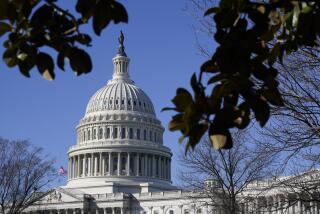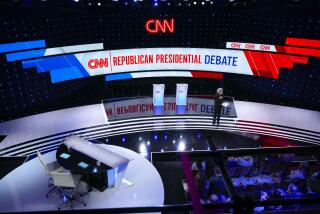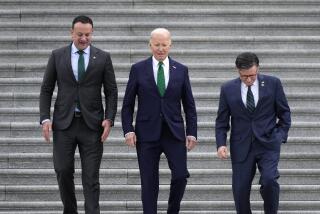Partying hard on soft money
When delegates travel to the Democratic and Republican nominating conventions late this summer, they’ll enter a cocoon of corporate largesse. Democrats will fly to Denver on reduced-fare tickets provided by United Airlines. Many will be picked up in plush new vehicles donated by General Motors that run on fuel made from “waste beer” donated by Molson Coors Brewing Co.
Like their GOP counterparts, they’ll communicate using state-of-the-art technology provided by Microsoft, Google, Qwest or AT&T.; And they’ll party at corporate-funded events surrounding a carefully calibrated convention that has become, basically, a multimillion-dollar infomercial underwritten by corporations and lobbyists whose influence both presidential candidates decry.
But for Democrats, at least, this may be the last year for such massive corporate funding. Presidential candidate Barack Obama says he wants things to change.
In a statement provided Tuesday to The Times, Obama campaign spokesman Hari Sevugan said: “Moving forward, one of Sen. Obama’s reform priorities will include changes in the way party conventions are funded to assure they can be run without dependence on soft money,” the loosely restricted corporate and union donations that constitute most of the funding for conventions.
That contrasts with GOP presidential candidate John McCain, who also has sought to cast himself as a reformer where money in politics is concerned. He sees no urgent need to revamp the way conventions are funded.
“John McCain believes that it is drastically more important to reform our country’s energy policy, tax code and the wasteful way the federal government treats taxpayer money than it is to try and provide further prohibitions on an entity [the convention host committee] that is already barred from political activity by law,” said McCain campaign spokesman Tucker Bounds, responding to Obama’s statement about funding conventions.
Both candidates pointed out that the convention funding system was in place long before they became their parties’ presumptive nominees.
Each party’s host committee is charged with raising more than $40 million, and the members of those committees and their informal advisors -- including the governors and other elected officials from Colorado, where Democrats will gather, and Minnesota, which will host the Republicans -- have met repeatedly with corporate donors, offering them perks in exchange for donations as high as $5 million.
Meanwhile, federal, state and local officials are dealing with a wide range of issues important to the contributing corporations -- energy conglomerates, manufacturers, health insurers, telecommunications firms and others that have already spent millions of dollars on lobbying this year.
Talking points prepared for Minnesota Gov. Tim Pawlenty before meeting with corporate officials in 2007 included a promise that donors to the host committee would have the opportunity to “connect with influential government officials (cabinet, president, next president).”
Pawlenty’s talking points were reproduced in a report on convention fundraising by the nonpartisan Campaign Finance Institute. The institute also reported that the host committee for the Democrats’ convention in Denver produced a “corporate sponsorship packet” that said donors giving more than $250,000 would be invited to “private events” with Colorado Gov. Bill Ritter Jr., Sen. Ken Salazar, Rep. Diana DeGette, Denver Mayor John Hickenlooper and others.
An upcoming report from the Campaign Finance Institute, which could be released as soon as today, will show that the more than 100 corporations and one labor union contributing to one or both conventions have spent more than $700 million on lobbying since 2005. They have also provided almost $100 million in campaign contributions through political action committees and individuals.
What makes special-interest funding of conventions especially awkward for McCain and Obama are the high-profile positions they have taken on money in politics.
McCain was the lead author of the 2002 campaign finance legislation banning large, corporate “soft money” donations in federal races. And he has limited lobbyists’ participation on his campaign staff as a way of strengthening his credentials as a reformer.
Yet the conventions are effectively funded through what campaign reformers call “the last soft money loophole,” the provision that allows corporate contributions to a convention’s host committee.
Obama has banned federal lobbyists from donating to his campaign or working on his official staff. Yet those lobbyists and their bosses are being asked to provide large checks for the conventions.
Convention budgets have risen dramatically in recent years; the conventions cost 14 times more than they did in 1992. With nominees normally chosen long before delegates convene, the conventions essentially have become huge -- and hugely expensive -- pep rallies for party activists and television infomercials designed to attract voters.
The parties construct multimillion-dollar podiums, build skyboxes for big donors and rehearse elaborately choreographed made-for-TV demonstrations and video presentations.
The person in charge of coming up with the money to fund the Democrats’ convention, Steven Farber, is a federal lobbyist. Farber, a partner at the law firm of Brownstein, Hyatt, Farber & Schreck, which has offices in Denver and Washington, remains $11.6 million short of the $40.6 million the Denver host committee pledged to raise to help fund the convention, which has a budget of about $70 million.
Corporate contributions overall to the two parties’ conventions amounted to just $1 million in 1980 and $8 million in 1992. The amount rose to $56 million in 2000 and $142 million in 2004, according to the Campaign Finance Institute’s report. This year, the report says, these contributions are expected to total $112 million but could go higher.
Denver convention officials have asked the Obama campaign for help. The campaign has not yet responded, and activists are watching closely.
Obama faces a dilemma. He has become the most proficient candidate in history at raising small donations from individuals. But if Obama asks for more money in the form of large checks from corporations or unions, he could undermine the credibility of his call for reform.
In theory, the 2002 reform law permitted corporate contributions to convention host committees because they were bipartisan groups set up to boost the host city’s image.
However, a look at who actually raises the funds shows that partisan elected officials on these committees often take the lead, according to the Campaign Finance Institute. And the contributions often come from companies with extensive political interests and regulatory issues.
Republicans flying to St. Paul will get discounted airfares courtesy of Twin Cities-based Northwest Airlines. Minnesota-based United HealthCare is also donating to both conventions. Waste Management Inc., which has operations in Minnesota and Colorado, will help with recycling and trash removal at the conventions.
General Motors is offering in-kind support to both conventions. It has donated cars to the presidential nominating conventions since 1980.
In Denver, a select group of elected officials, former candidates and party chairs, among others, will have access to 450 new GM SUVs and passenger cars, some with volunteer drivers. For the GOP convention, the automaker is furnishing 285 vehicles, a mix of SUVS, vans and passenger cars.
The GM gifts could be especially sticky for Obama. On the stump, he often points to his 2007 address to the Detroit Economic Club, in which he told automakers that they shared responsibility for the nation’s oil dependence and called for higher fuel standards. “Nobody clapped,” he likes to say.
Similarly, the convention nominating McCain will feature donations from telecommunications firms that have long lobbied the senator and his staff because of his role as a senior member of the Senate Commerce Committee, which oversees the Federal Communications Commission.
Both candidates have railed against drug company pricing, yet several drug companies, including Merck, Lilly and Pfizer, are listed as sponsors of the Democratic convention.
peter.nicholas@latimes.com
--
(BEGIN TEXT OF INFOBOX)
Big spenders
Corporate donors to this fall’s two major political party conventions have spent millions of dollars to support political candidates and lobby the federal government.
*--* -- -- Federal election Federal lobbying -- -- contributions expenditures -- No. of corporations since 2005 since 2005 Democratic National Convention 80 $76,395,550 $552,958,060 donors Republican National Convention 52 $63,247,395 $449,167,092 donors Donors to 25 $41,436,982 $280,783,610 both conventions Net donors 107 $98,205,963 $721,341,542 *--*
Convention contributions
Here’s a look at what some major companies are donating:
Microsoft: $4 million in consulting and technology services to the two conventions. The company will help Democrats webcast the convention and offer Republicans access to a state-of-the-art device for navigating the convention site.
Molson Coors: About $1 million in cash and in-kind services to the Democratic convention. That includes beer for parties and ethanol made from beer waste.
General Motors: 450 vehicles for the Democratic convention, 285 for the Republicans. Vehicles will include hybrid
Chevy Tahoes, Chevy Malibus and Saturn Vues.
AT&T;: Hundreds of “smart” phones to Democratic convention staff, along with hardware, software and wireless modems. The company says its contribution to the Republicans is of equal value, though it is not providing phones and certain services.
United Airlines: Discounted tickets to Democratic delegates, officials and staff.
Northwest Airlines: 15% discounts for all convention-goers.
--
Sources: Campaign Finance Institute; Center for Responsive Politics; Times reporting
Leslie Carlson Los Angeles Times
More to Read
Get the L.A. Times Politics newsletter
Deeply reported insights into legislation, politics and policy from Sacramento, Washington and beyond. In your inbox three times per week.
You may occasionally receive promotional content from the Los Angeles Times.






